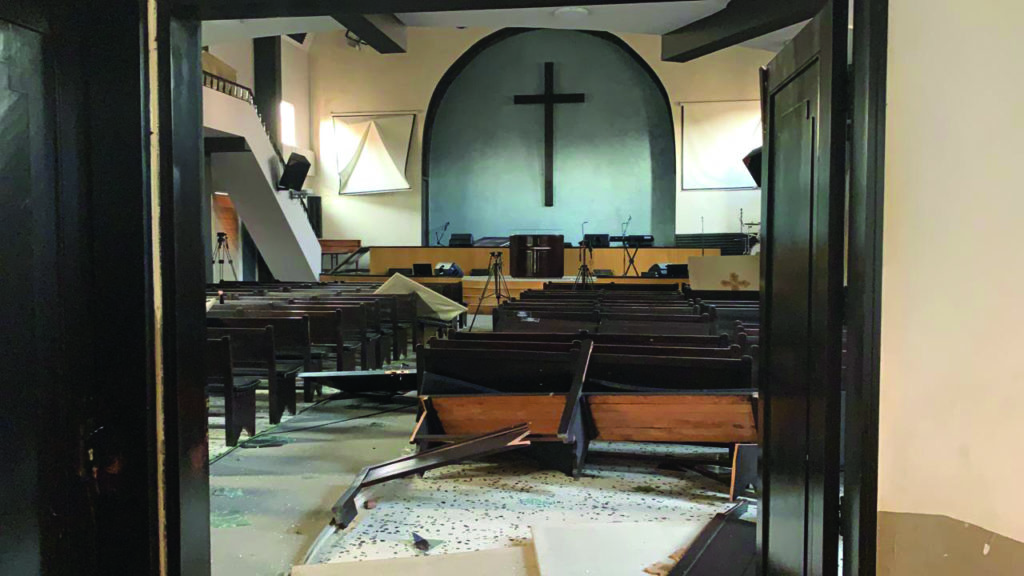
Lebanon Recovering From the Beirut Mega-Blast
Published on: 3.12.2020By: David R. Parsons, VP & Senior Spokesman
As if Lebanon did not have enough troubles already, the city of Beirut was suddenly rocked by a massive explosion in the busy port area in early August, killing at least 190 people, injuring 6,500 more and leaving 300,000 homeless. Considered the world’s largest conventional detonation in recent memory, the mega-blast was apparently caused by a welder’s accident which set off nearly 3,000 tons of ammonium nitrate negligently stored at the Beirut port. An international probe is underway to find those responsible for storing this dangerous material so recklessly, and if it turns out Hizbullah is to blame it could further destabilise a country already reeling from an unprecedented economic meltdown.
As Lebanon slowly began to recover from this crushing blow, local authorities quickly pieced together that a large shipment of the highly combustible fertilizer was impounded in the port six years earlier but had been perilously stored in a nearby warehouse. Suspicions instantly fell on Hizbullah, which effectively controls the port and knows of the dual use of ammonium nitrate in weapons production. In recent years, European intelligence agencies have intercepted two shipments of the dangerous substance being arranged by Hizbullah operatives, and its leader Sheikh Hassan Nasrallah even joked once in a video message about using it to set off a nuclear-type explosion in Haifa. Thus, many believe Hizbullah latched onto the impounded shipment and was planning to use it to attack Israel.
The immense tragedy came as Lebanon was already in the throes of its worst-ever economic collapse, with the lira losing 80% of its value. This financial ruin was well underway long before the Corona pandemic hit the country, and most analysts blame Hizbullah for siphoning off the country’s resources to fuel its campaign to destroy Israel and its military adventures in Syria.
A recent report estimated it will take $93 billion to bail Lebanon out of the staggering debts that have piled up due to Hizbullah’s malfeasance. And that was before the recent explosion blew a huge crater in Beirut’s busy port and added another $15 billion to the bill.
France, which has colonial ties to Lebanon, has taken the lead in investigating the blast and in the international effort to help Lebanon recover. But it is conditioning foreign assistance on reforms in Lebanon’s unique sectarian-based governing system, which could challenge Hizbullah’s grip on power.
Hizbullah is deeply embedded among the Shi’ites of Lebanon, who make up one-third of the population. And Iran has built Hizbullah into a regional military power now armed with over 150,000 rockets and missiles – far more than the militaries of all but a handful of countries. As a result, Hizbullah essentially holds a veto over Lebanese government decisions.
Yet even many Shi’ites are starting to complain about the way Hizbullah has bankrupted the nation and sent their sons off to die in the Syrian civil war. Meanwhile, Sheikh Nasrallah – once hailed as a hero in the Arab world – is now openly mocked and hung in effigy on the streets of Beirut.

ICEJ Global Family Assists our Lebanese Brethren
While the international community seeks to help steer Lebanon through this latest national crisis, Christians around the world responded quickly to our appeals for donations to help local churches and ministries in Beirut recover from the impact of the blast. Over recent weeks, the International Christian Embassy Jerusalem has transferred over $35,000 in contributions to help several churches, prayer houses and other ministries in the Beirut area repair damages to their facilities and reach out to their communities with a strong Christian witness. These are all part of a network of ministries in the region who have adopted the ‘Isaiah 19 Highway’ vision of reconciliation between Israel and the Arab world. We are grateful to Tom and Teresa Craig of Lighthouse Ministries for their key role in connecting us to these precious Lebanese brothers and sisters in Christ.